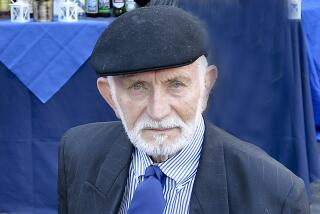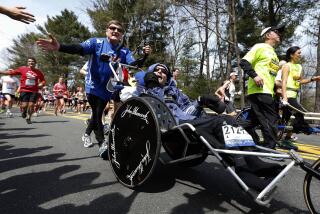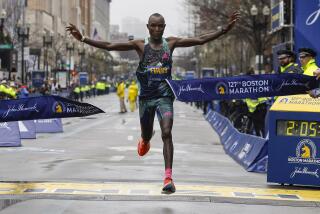Johnny Miles, 97; Won the Boston Marathon Twice
Johnny Miles, a Canadian who achieved one of distance running’s greatest upsets by winning the Boston Marathon in 1926, has died. He was 97.
Miles died June 15 in the Ontario province city of Hamilton. The cause of death was not reported.
Wearing a pair of 95-cent sneakers, shorts and a homemade jersey featuring a red maple leaf, Miles was running in his first marathon when he entered the 30th Boston Marathon in April 1926.
The favored runners in the field of 96 were Clarence DeMar, the winner of three consecutive Boston Marathons, who held the record of 2:29:40.5; and Albin Stenroos, the Finnish runner who had won the marathon at the 1924 Olympics in Paris.
Miles had hoped merely to stay with the two elite runners. But as the race developed DeMar fell far behind, and Stenroos took the lead.
“When we came to Heartbreak Hill,” a particularly difficult section of the course, Miles told the Boston Globe several years ago, “I looked at Stenroos and his eyes were sunken, his face was kind of pulled in and I figured this was the time to pass him. I passed him on Heartbreak Hill and I was afraid to look behind me again, for fear he was coming.”
But Miles had nothing to fear. After pulling ahead at Heartbreak Hill, about 22 miles into the race, he went on to victory with a time of 2:25:40. He was a full four minutes ahead of Stenroos, who finished second. DeMar, whose record had been shattered by Miles, finished third.
Miles was born in Yorkshire, England, but his family moved to Nova Scotia when he was a boy so his father could take a job in the coal mines.
As the eldest son, Miles was compelled to help make ends meet when his father went off to Europe to fight in World War I. He went to school during the day, and when classes ended at 3 p.m. he would head for the coal mines to work the swing shift, operating shaft doors to let trains pass.
He left the mines when his father returned from the war, but still worked his way through school driving a team of horses delivering groceries.
Miles also started running and began winning local races; the prizes that went with them often consisted of a bag of flour or a fishing pole.
His father established a training regimen for Miles that involved running about 30 miles a week and told him that he would sponsor him to Boston if he won an annual 10-mile race in Halifax.
Miles easily won and began training for Boston.
After his victory in the marathon, Miles was the toast of Boston and Canada. He competed in three more Boston Marathons, winning again in 1929. He also represented Canada in two Olympics, including the 1932 games in Los Angeles, but failed to win a medal in either Olympiad.
He left competitive running to take a job at International Harvester. He worked there for 43 years, before retiring in 1970.
Bess, his wife of more than 50 years, died in 1997. They had no children.
More to Read
Go beyond the scoreboard
Get the latest on L.A.'s teams in the daily Sports Report newsletter.
You may occasionally receive promotional content from the Los Angeles Times.










